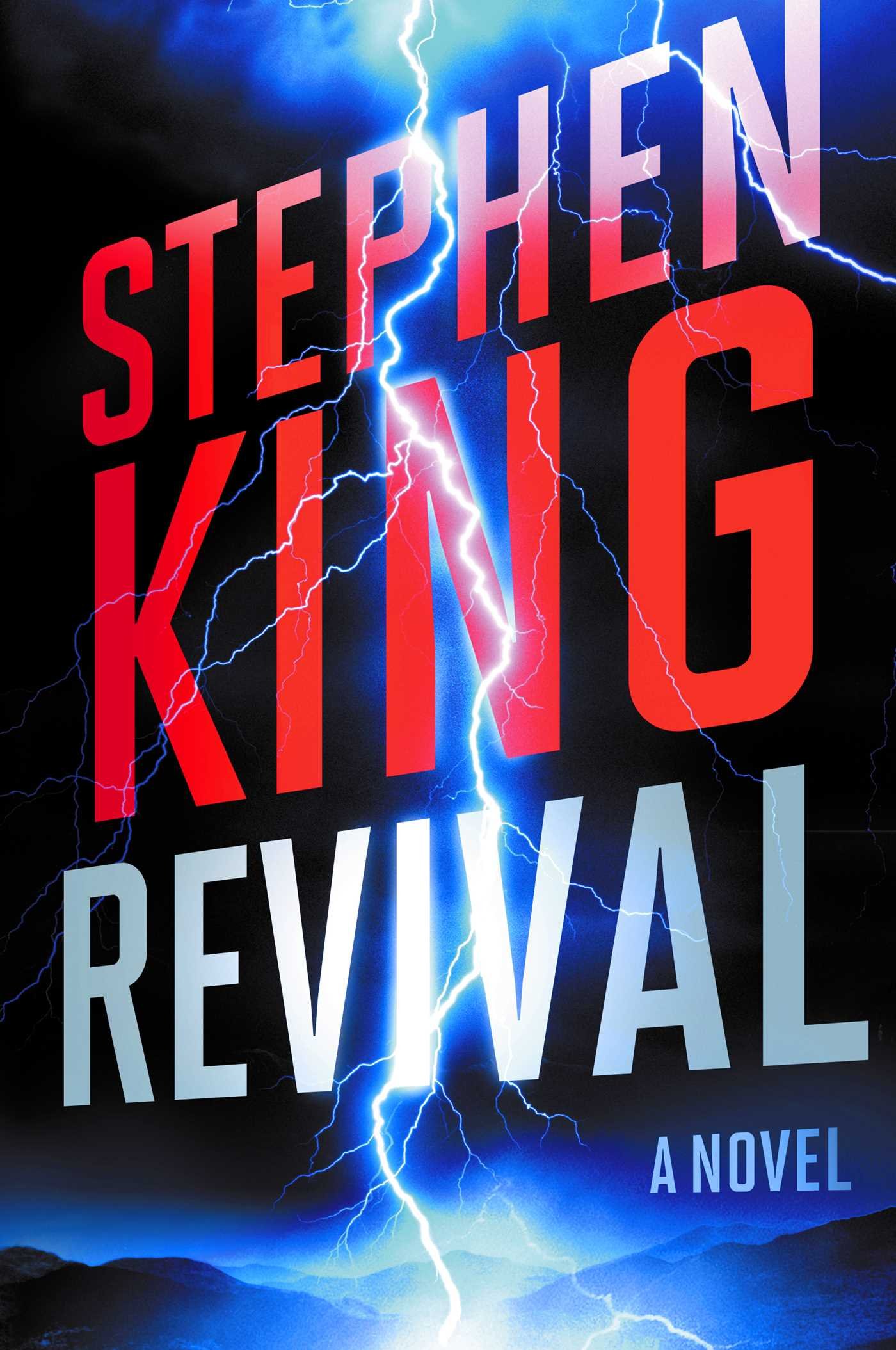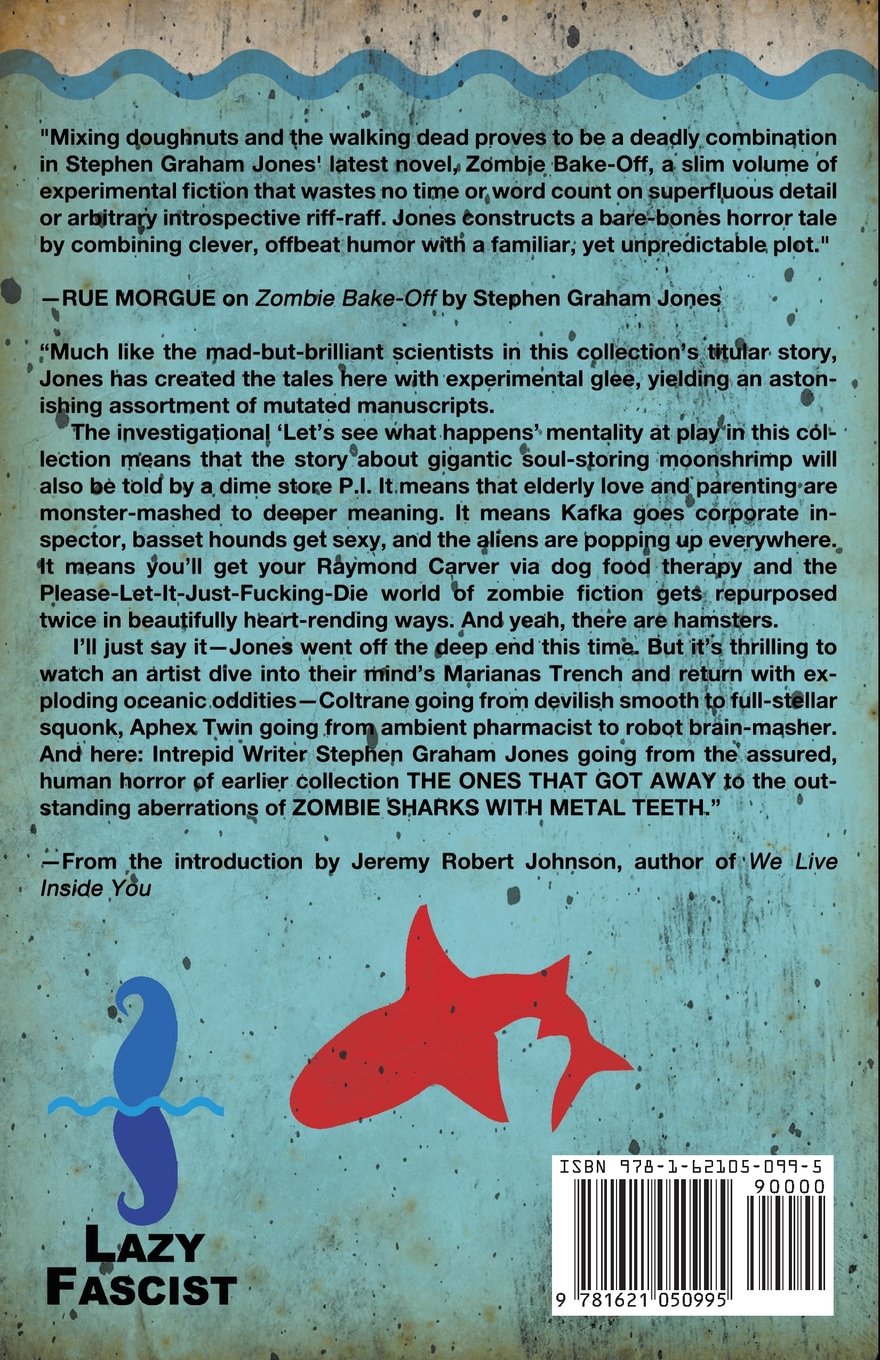Look, I'm the type of person who, if you give your book this amazing title and adorn it with this amazing artwork, I'll buy it before I really knew what hit me. It's a Pavlovian reflex for a dog like me. Plus I'd already read Jones's
Zombie Bake-Off (2012) and was very eager for more.
I polished this sucker off pretty quick after receiving it in the post (I don't know if local bookstores even stock this kind of stuff). It's a compulsively readable collection of short stories and yes, there's a titular one. But no (I think readers deserve to know), there are no zombie sharks with metal teeth, not really - I mean, yes, technically there are, right at the end of that story, but barely and only in a passing conjecture. This surprised and disappointed me because
Zombie Bake-Off had been about exactly that. And when the blurb said it had zombie soccer moms vs. zombie pro-wrestlers, it wasn't lying or exaggerating. The whole novel's setting was a bake-off and the whole novel's action involved pro-wrestlers, soccer moms, and zombies - battling each other and a small band of the living. So I don't think I was out of bounds in expecting from the titular story of this collection literal undead sharks that somehow had teeth made of metal.
But I wasn't disappointed with this volume, no no no. When what it
does give you is plenty of stories that
do feature zombies, in fresh variations of scenario and depth of survivor characterisation, and a story about a hardboiled detective flying through outer space by means of being psychically implanted into a giant space-faring lobster, and enigmatic alien encounters aplenty, more apocalypses than one has a right to expect from a collection, the most elliptical meta-fictional slasher story you'll ever read, and a story starring Rod Serling, well, you don't complain, you give thanks.
But the reader will inevitably wonder: what am I reading? What is this stuff? Horror? Well, some of it, yeah. Sort of. Science fiction? Some of those too. Kind of. Weird fiction or ‘the New Weird’? Mm, not really, not to me, not from what I've read of China Mieville and Jeff VanderMeer - this is a different kettle of queer fish. Is it ‘bizarro’ fiction? I guess maybe that’s the main thing I expected from the title and cover art. But that label too only partly captures it. I want to say these stories feel like they're by someone who set out to be a pulp writer influenced by the cosmic horror of Lovecraft (or, probably closer to the mark, the nihilism of Romero's classic Dead Trilogy), but said pulp-ist got liberal arts educated and introspective and transmuted his impulse toward horror through the likes of, what... Wes Anderson? David Foster Wallace? I don’t know exactly. (I don’t have the reference in my experience, but I’m sure someone does.) There’s an unflinching attention to monstrosity, violence, freakishness, aliens, cosmology-that-dwarfs-the-cosmologist, and so on. But it’s all delivered through a very sensitive, even tender, heart. Indeed, even though there is bloodshed and body-horror aplenty in this book, my final impression is that it is gentle, contemplative. And I think that's just Stephen Graham Jones. No one genre or genre-mix can really hold him. He does what he does.
Despite being clearly intellectual, it all comes across fairly working-class too. The characters tend to be underlings in offices or warehouses or laboratories. Or they're young or old married couples who remain devoted to each other despite (or because of?) discovering very disturbing darknesses about one another. Or they're little kids being cruel and kind to one another as kids do.
Part of the gentle contemplativeness is also down to the way tales are told, for they are as much about the telling as the subject matter. The diction is at first hard to parse until you get the hang of Jones's almost oral cadences and patterns, like how a normal guy from right here and now would talk to you, would unfold a narrative to you in person. Yet, paradoxically, it's also poetic and writerly, made for the page it seems to me. It's downright mesmerising when you get into its rhythms.
And (I had never noticed how much this also is how it sounds when someone is telling you a story they know off the cuff) though the narrator usually seems to know what’s coming and codes that story arc into the opening pages, these tales do not feel heavily plotted. Stephen King
says stories are pre-existing fossils that writers discover and unearth and that plotting is a jackhammer that breaks as much as it liberates. Jones feels almost hyper-aware of this. He works very delicately, mostly with small hand spade and brush, to exhume the tales he's found. He leaves a lot of the story still buried. But he has taken depth-readings and he knows what’s down there, if murkily, and I tended to find myself halfway through a story going back over its first few pages with a better understanding of all that was being revealed to me right off. In other words, Jones writes richly enough that (as with
Gene Wolfe) re-reading is almost required, and a pleasure. You get your money's worth.
Philosophically, the stories evince ruminations rife with material for my own interests in monster theory and horror theory ('Little Monsters' is a two-page piece packed tight with fodder for this and I hope to do a separate post about it). The story 'How Billy Hanson Destroyed the Planet Earth, and Everyone On It' is my favourite contemporary mutation of Lovecraftian cosmic horror that I've encountered. It
is a mutation though, as is every other bleak demise of humanity or relativising of humanity in the face of infinity that Jones depicts. There's definitely a warm beating heart underneath the cosmic coldness in Jones's take. What I can't tell is whether he's simply saying let's hold onto our scrap of humanity even in the face of the nothingness that will eventually devour us all, or whether he might just might be saying that such 'scrap of humanity' might just might actually be a grubby little hint or clue that nothingness is not necessarily the final word about either us or the cosmos. Even Cthulhu and his elder god ilk look very different in Jones's vision: alien intelligences vastly above us may view us only as food, sure, but that doesn't mean they might not be 'humane' souls who cause us no more suffering than is necessary. The story 'Catch and Release' is the best variation on an old s.f. twist-ending that I've come across and illustrates this almost
anti-Lovecraftian theme poignantly.
Jones says in an
interview (the interview is a masterclass in creative writing, by the way) that one of his favourite short stories is about a boy who can predict the future who has a TV show:
But then one day he looks ahead and sees this comet just hurtling to Earth, to wipe us all out, no chance of survival, no Bruce Willis, so, on his program that morning, he looks right into the camera and he says that this is going to be the best day ever. That people are going to hug each other, nobody's going to be unhappy, all of it. It's the best gift he could possibly have given the world, and it's a lie. This is at the bottom of everything I write.
What I wonder is whether Jones thinks that this 'lie' gives the lie to ultimate meaninglessness, whether he thinks that maybe such a 'lie' really serves a greater truth about us and the world. I don't know. (His delightful story notes at the end of the book are, though disarmingly vulnerable, as elliptical as the stories themselves and only deepen the mystery and poignancy.)
I do know I can't wait to read more by him (I've got his first novel
The Fast Red Road: A Plainsong coming in the post).









